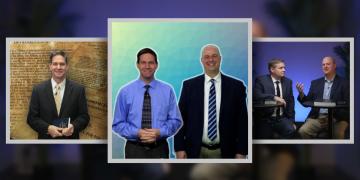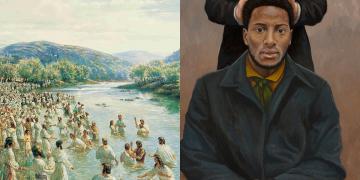You are here
Philippians; Colossians: “I Can Do All Things through Christ Which Strengtheneth Me”
The Pauline epistles of Philippians and Colossians only receive brief attention in the official Come Follow Me curriculum for The Church of Jesus Christ of Latter-day Saints. Nevertheless, these texts contain valuable teachings for Latter-day Saints. For instance, much of the language of the thirteenth Article of Faith is drawn from Philippians:
|
Article of Faith 13 |
Philippians 4:8 |
|---|---|
|
We believe in being honest, true, chaste, benevolent, virtuous, and in doing good to all men; indeed, we may say that we follow the admonition of Paul—We believe all things, we hope all things, we have endured many things, and hope to be able to endure all things. If there is anything virtuous, lovely, or of good report or praiseworthy, we seek after these things. |
Finally, brethren, whatsoever things are true, whatsoever things are honest, whatsoever things are just, whatsoever things are pure, whatsoever things are lovely, whatsoever things are of good report; if there be any virtue, and if there be any praise, think on these things. |
Additionally, “A second important connection is the embedded hymn found in [Philippians] 2:6–11 (compare Colossians 1:13–20), which documents the early Christian belief in the divinity of Jesus Christ. In succinct form, it presents the doctrine of Christ, his descent to the earth, and his exaltation, which provide a pattern for Latter-day Saint teachings on the topic.”1 When carefully restructured, the poetic or hymnal nature of this passage shines through and gives profound aesthetic quality to Paul’s words:
Have this in mind among you as it was in Christ Jesus,
|
who was in the form of God, |
|
|
|
did not suppose that equality with God |
|
|
was a prize to be seized, |
|
but he poured himself out |
|
|
|
and took the form of a slave, |
|
|
and he was born like human beings. |
|
|
And he was found in human form; |
|
he humbled himself |
|
|
|
and was obedient to the point of death: |
|
|
death on the cross. |
|
Therefore, God exalted him on high |
|
|
|
and freely bestowed on him the name |
|
|
that is above every name |
|
so that in the name of Jesus |
|
|
|
every knee should bend in worship |
|
|
in the heavens, on earth, and among those who dwell beneath |
|
|
the earth |
|
and every tongue will confess |
|
|
|
the Lord Jesus Christ, |
|
|
to the glory of God the Father. (Philippians 2:6–11)2 |
This hymn contains rich theological material that complements Nephi’s teachings about the condescension of God (1 Nephi 11:16), and should therefore not be overlooked by Latter-day Saints studying this important scriptural theme.3
Both Philippians and Colossians also contain apostolic warnings from Paul that give modern readers a sense of the growing apostasy that would eventually overtake the first-century church:
|
Philippians 3:2–3 |
Colossians 2:8, 18 |
|---|---|
|
Beware of dogs, beware of evil workers, beware of the concision. For we are the circumcision, which worship God in the spirit, and rejoice in Christ Jesus, and have no confidence in the flesh.
|
Beware lest any man spoil you through philosophy and vain deceit, after the tradition of men, after the rudiments of the world, and not after Christ. . . . Let no man beguile you of your reward in a voluntary humility and worshipping of angels, intruding into those things which he hath not seen, vainly puffed up by his fleshly mind. |
Modern followers of Jesus Christ are no less susceptible to “vain deceit” and the philosophies of men as those of the first century, and would do well to heed Paul’s warnings in these two epistles.
While Paul’s warnings about the ever-present dangers of apostasy may be sobering, he concluded his epistle to the saints at Philippi with this encouragement that still rings vibrantly some 2,000 years later: “I know both how to be abased, and I know how to abound: every where and in all things I am instructed both to be full and to be hungry, both to abound and to suffer need. I can do all things through Christ which strengtheneth me” (Philippians 4:12–13).
Related Articles
- 1. Thomas A. Wayment, The New Testament: A Translation for Latter-day Saints: A Study Bible (Provo and Salt Lake City, UT: Religious Studies Center, Brigham Young University, and Deseret Book, 2019), 351.
- 2. Wayment, The New Testament, 353.
- 3. Frank F. Judd Jr., “The Condescension of God according to Paul,” Shedding Light on the New Testament: Acts–Revelation, ed. Ray L. Huntington, Frank F. Judd Jr., and David M. Whitchurch (Provo, UT: Religious Studies Center, Brigham Young University, 2009), 171–192.
Subscribe
Get the latest updates on Book of Mormon topics and research for free










